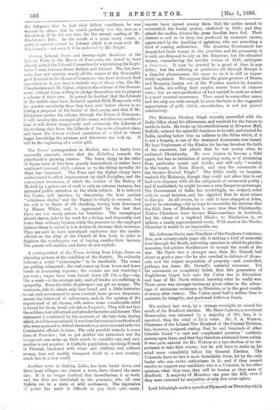A correspondent of the Times, writing from Liege, draws an
alarming picture of the condition of the district. He evidently believes a social " catastrophe " to be inevitable. The mines are getting exhausted ; the coal comes up from lower and lower levels at increasing expense ; the owners are not receiving 2 per cent. ; wages have been forced down till 2 fr. a day—say, 10s. a week—is the average rate ; and all trades are suffering in sympathy. -Even the little shopkeepers can get no money. The workmen, able to obtain only bare bread and a little butterine \ to eat, and accustomed to more comfort, have grown desperate, accuse the better-off of callousness, and, in the opinion of the experienced of all classes, will, unless some considerable relief is found for them, break out into a Jacquerie. They will not face the soldiers, but will attack and plunder factories and houses. This statement is confirmed by the accounts of the late riots, during which, it will be remembered, it was found necessary to authorise all who were menaced to defend themselves, a most unusual order for Continental officials to issue. The only possible remedy is some form of Poor-law ; but as yet neither the statesmen nor the bourgeoisie can make up their minds to consider one, and emi- gration is not popular. A Catholic population, speaking French or Flemish, burdened with wives and children and without money, does not readily transport itself to a new country, muck less to a new world.




































 Previous page
Previous page